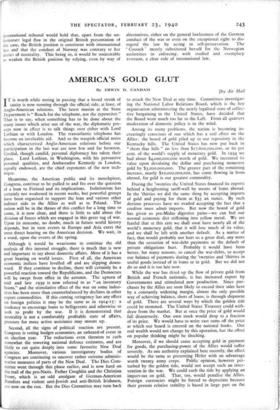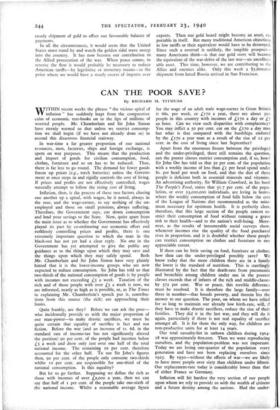AMERICA'S GOLD GLUT
By ERWIN D. CANHANI
[by Air Mail 1T is worth while noting in passing that a broad streak of sanity is now running through the official side, at least, of Anglo-American relations. The latest maxim at the State Department is " Reach for the telephone, not the typewriter." That is to say, when something has to be done about the many issues which arise out of the war, the diplomatic pre- cept now in effect is to talk things over either with Lord Lothian or with London. The transatlantic telephone has become an invaluable aid. And so the waspish official notes which characterised Anglo-American relations before our participation in the last war are now few and far between. Cordial, though candid, personal diplomacy has taken their place. Lord Lothian, in Washington, with his persuasive personal qualities, and Ambassador Kennedy in London, equally endowed, are the chief exponents of the new tech- nique.
Meantime, the American public and its mouthpiece, Congress, continue to be pulled to and fro over the question of a loan to Finland and its implications. Isolationism has certainly not weakened in recent weeks, but powerful groups have been organised to support the loan and various other indirect aids to the Allies as well as to Poland. The nation will be in the throes of this conflict for a long time to come, it is now clear, and there is little to add about the division of forces which are engaged in this great tug of war. Upon its outcome, no doubt, much in future world history depends, but in turn events in Europe and Asia exert the most direct bearing on the American decision. We wait, in a word, upon the events of the spring.
Although it would be wearisome to continue the old analysis of this internal struggle, there is much that is new and important to say about domestic affairs. Most of it has a great bearing on world issues. First of all, the American economic indices have levelled off and are slipping down- ward. If they continue to decline, there will certainly be a powerful reaction toward the Republicans, and the Democrats will be swept from office in the autumn. The upturn of mid and late 1939 is now referred to as " an inventory boom," and the stimulative effect of the war on some indus- tries has been more than counterbalanced by declines in other export commodities. If this coming stringency has any effect on foreign policies it may be the same as in 1914-15: a tendency to encourage loans to belligerents and otherwise to seek to profit by the war. If it is demonstrated that neutrality is not a comfortably profitable state of affairs, pressure for more active assistance may mount up.
Second, all the signs of political reaction are present. Congress is voting budget economies, an unheard-of event in an election year. The reductions even threaten to curb somewhat the towering national defence estimates, and are likely to cut quite deeply into some favourite New Deal agencies. Moreover, various investigatory bodies of Congress are continuing to uncover rather extreme adminis- trative measures of parts of the New Deal. The Dies Com- mittee went through this phase earlier, and is now hard on the trail of the pro-Nazis. Father Coughlin and the Christian Front, which is an odd amalgam of German-American Bundists and violent anti-Jewish and anti-British Irishmen, are now on the run. But the Dies Committee may turn back to attack the New Deal at any time. Committees investigat- ing the National Labor Relations Board, which is the key organisation administering the newly legalised state of collec- tive bargaining in the United States, have decided that the Board went much too far to the Left. From all quarters moderation of domestic policy is in the wind.
Among its many problems, the nation is becoming in- creasingly conscious of one which has a real effect on the Allies : the hoard of gold piled up in our repository in the Kentucky hills. The United States has now put back in " them thar hills " no less than $17,600,000,000, or 6o per cent. of the world's supply of monetary gold. In 1934 we had about $4,000,000,000 worth of gold. We increased its value upon devaluing the dollar and purchasing monetary gold by $3,000,000,000. The greater part of the remaining increase, nearly $10,000,000,000, has come flowing in from abroad, for gold is our greatest commodity.
During the 'twenties the United States financed its exports behind a heightening tariff-wall by means of loans abroad. In the 'thirties we did the same thing by accepting imports of gold and paying for them at $35 an ounce. By such devious processes have we evaded accepting the fact that a creditor must admit imports. But now the hoard of gold has given us pre-Midas digestive pains—we can feel our normal economic diet stiffening into yellow metal. We are fearful that at this rate we shall soon have nearly all of the world's monetary gold, that it will lose much of its value, and we shall be left with another default. As a matter of fact, that would probably not hurt us a great deal, any more than the cessation of war-debt payments or the default of private obligations hurt. Probably it would have been better, for many reasons, to cancel the war-debts, to accept our balance of payments during the 'twenties and 'thirties in useful goods instead of in loans or in gold. But we did not do so and it is too late now.
While the war has dried up the flow of private gold from British and French nationals, it has increased export by Governments and stimulated new production. Since pur- chases by the Allies are soon likely to exceed their sales here by a constantly widening margin, almost the only possible way of achieving balance, short of loans, is through shipment of gold. There are several ways by which the golden tide could be stemmed. The United States Treasury could with- draw from the market. But at once the price of gold would fall disastrously. Our own stock would drop to a fraction of its price. We would have to write vast sums off the price at which our hoard is entered on the national books. Our real wealth would not change by this operation, but the effect on popular thinking might be shocking.
Moreover, if we should cease accepting gold in payment for goods, the purchasing-power of the Allies would suffer severely. As one authority explained here recently, the effect would be the same as presenting Hitler with an advantage worth twenty army corps. Public opinion, however per- turbed by the golden tide, would not accept such an inter- vention in the war. We could curb the tide by applying an import-tax on gold. That, too, would penalise the Allies. Foreign currencies might be forced to depreciate because their present relative stability is based in large part on the steady shipment of gold to offset our favourable balance of payments.
In all the circumstances, it would seem that the United States must stand by and watch the golden tidal wave sweep into the country. It has now become our contribution to the Allied prosecution of the war. When peace comes, to reverse the flow it would probably be necessary to reduce American tariffs—by legislative or monetary means—to the point where we would have a steady excess of imports over exports. Then our gold hoard might become an asset, ex- portable in itself. But many traditional American objections to low tariffs or their equivalent would have to be destroyed. Since such a reversal is unlikely, the tangible prospect— many Americans think—is that our gold store will become the equivalent of the war-debts of the last war—an uncollect. able asset. This time, however, we are contributing to the Allies and enemies alike. Only this week a $5,600,000 shipment from hated Russia arrived in San Francisco.







































 Previous page
Previous page